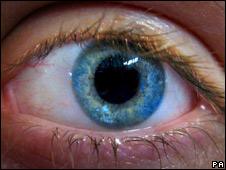Cancer drug hope for eye disorder
- Published

Age-related macular degeneration leads to a progressive loss of sight
A cheap drug used to treat bowel cancer should also be prescribed to patients with a condition that leads to sight loss, say UK researchers.
Avastin is not yet licensed for age-related macular degeneration, which is a leading cause of blindness in the UK.
But a study suggests the drug is effective and cheaper than the current medication, they report in the British Medical Journal.
Ministers have asked the drugs body NICE to explore its value.
Age-related macular degeneration (AMD) is the leading cause of sight loss in patients over the age of 50 in Europe and North America.
"Dry" AMD is the most common form of the condition, which develops very slowly, causing gradual loss of central vision.
"Wet" AMD, which occurs in about one in 10 patients, can develop quickly and lead to sight loss.
Tests
Researchers at three eye centres in London, Bristol and Cheltenham carried out a pilot study in 131 patients with wet AMD.
The ABC trial compared Avastin with standard treatment available at the time, although they did not compare it directly to the licensed drug, Lucentis, which costs about £10,000 per patient on average.
They concluded that Avastin was "superior to standard care".
Two clinical trials comparing the use of Avastin and Lucentis are expected to report results in a year or two.
Ophthalmologists around the world have been injecting tiny quantities of Avastin into the eyes of patients on an experimental, or "off-label" basis.
They report success at low cost because one course can be split and used for dozens of patients.
The drug firm, Roche, which markets Avastin, has not applied for the drug to be used for wet AMD.
Barbara McLaughlan, RNIB campaigns manager for eye health and social care, said patients should continue to be treated with Lucentis until "robust evidence" was available on the safety and effectiveness of Avastin.
The pharmaceutical company, Novartis, which makes Lucentis (ranibizumab), said in a statement: "Given the limitations of the ABC trial, such as the small number of patients, exclusion of certain high-risk patients, the relatively short follow-up period, and treatment decision based on the availability of public funding, the strength of evidence from this trial - especially in terms of safety data - must be regarded as limited."